Report: Sustainable and Responsible Management in the Tourism Sector
VerifiedAdded on 2023/01/11
|13
|5097
|97
Report
AI Summary
This report provides a comprehensive overview of sustainable and responsible tourism. It begins with an introduction to the concept and its evolution, emphasizing the need for continuous growth and the satisfaction of local community needs. The report then delves into the roles and missions of global organizations such as the World Tourism Organization (WTO) and the World Travel and Tourism Council (WTTC), highlighting their efforts in promoting sustainable practices. It explores the principles and purposes of sustainable tourism, including optimum resource utilization, biodiversity maintenance, and economic development. The report also examines various approaches to tourism development and planning, such as institutional, product-based, and historical approaches. Furthermore, it assesses the economic, social, cultural, and environmental impacts of tourism activities, evaluating how sustainability is developed and managed in different destinations like Australia, the UK, and Italy. The report concludes by emphasizing the importance of sustainable tourism for long-term industry growth and the preservation of natural resources.
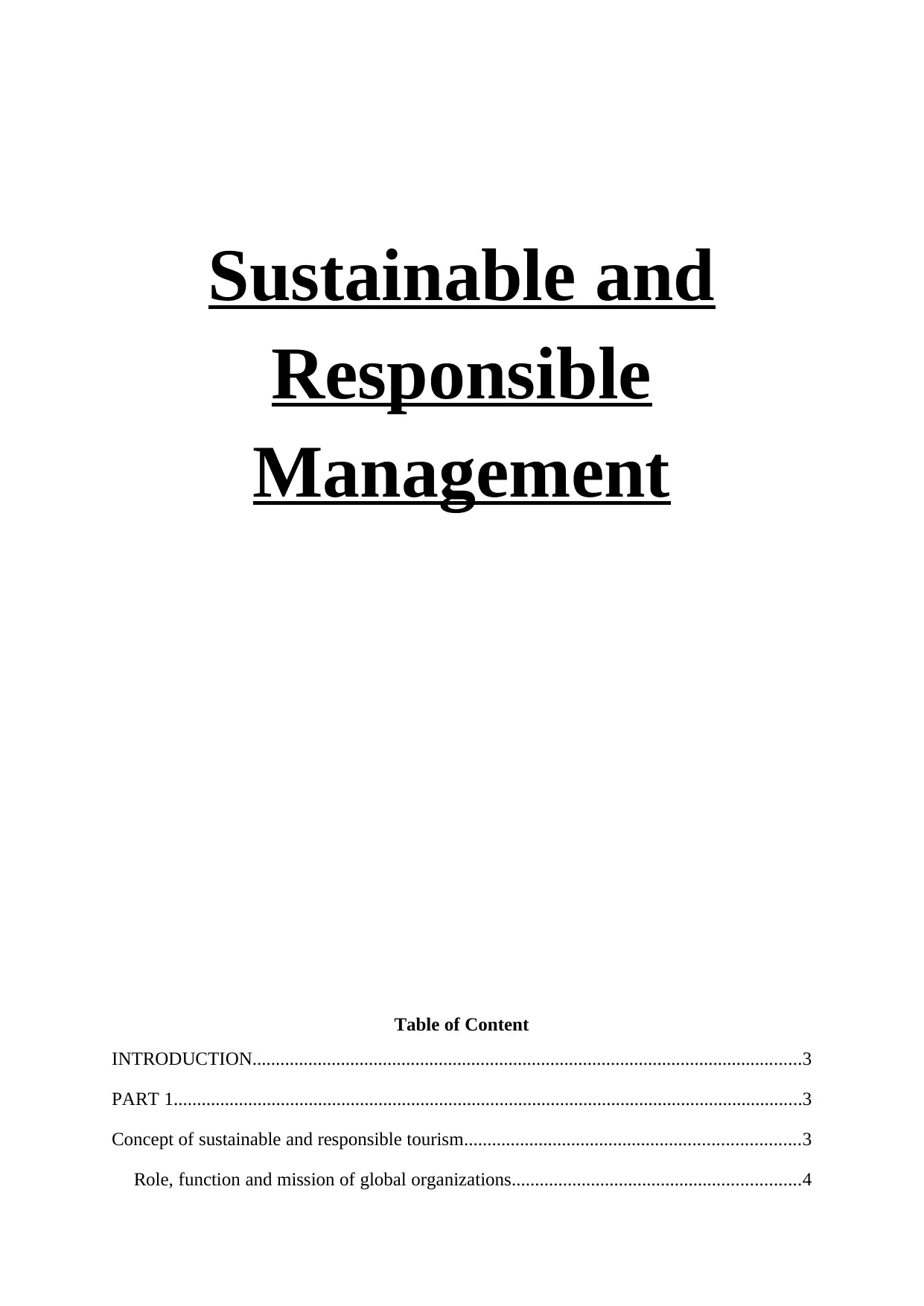
Sustainable and
Responsible
Management
Table of Content
INTRODUCTION......................................................................................................................3
PART 1.......................................................................................................................................3
Concept of sustainable and responsible tourism........................................................................3
Role, function and mission of global organizations..............................................................4
Responsible
Management
Table of Content
INTRODUCTION......................................................................................................................3
PART 1.......................................................................................................................................3
Concept of sustainable and responsible tourism........................................................................3
Role, function and mission of global organizations..............................................................4
Paraphrase This Document
Need a fresh take? Get an instant paraphrase of this document with our AI Paraphraser
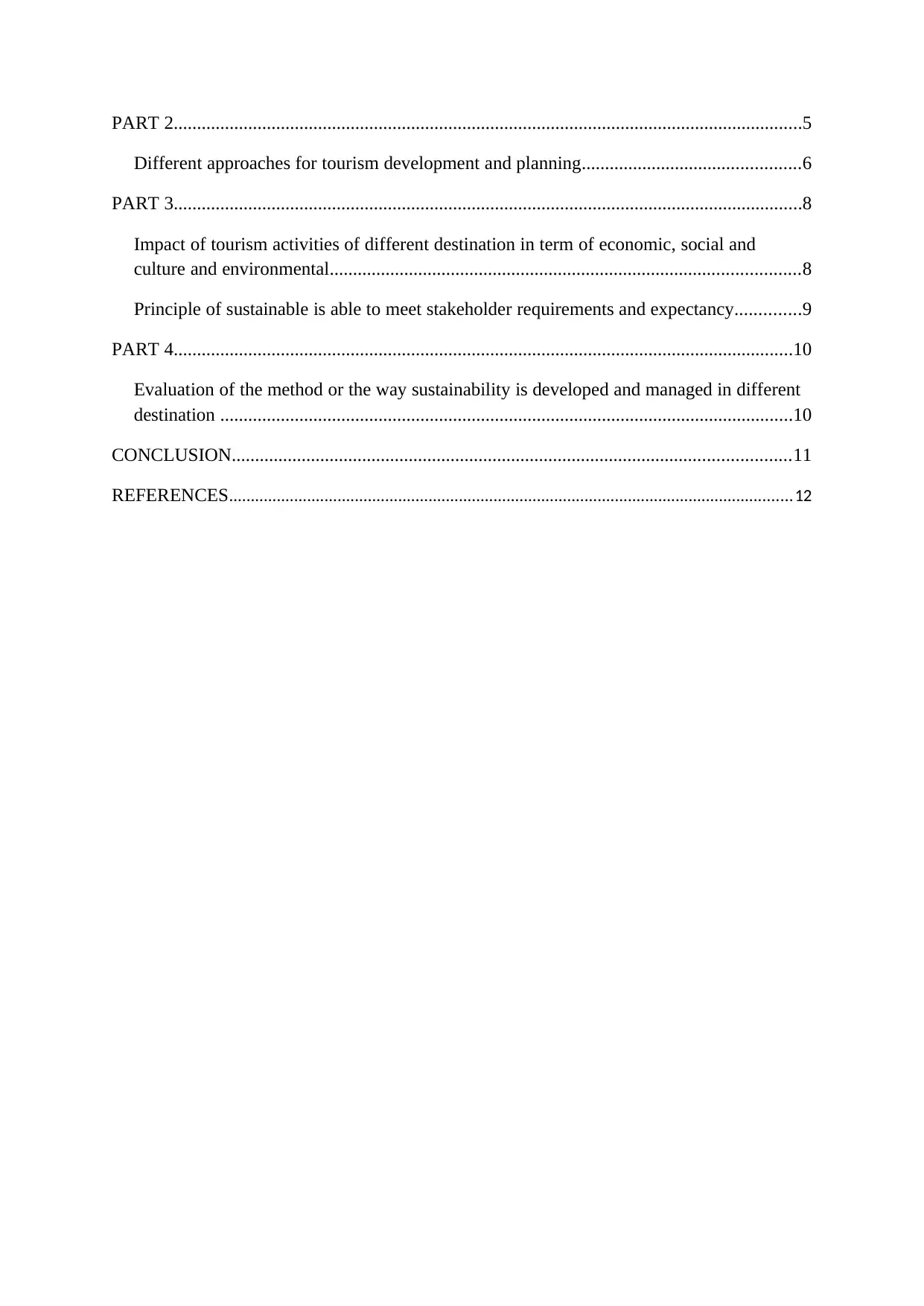
PART 2.......................................................................................................................................5
Different approaches for tourism development and planning...............................................6
PART 3.......................................................................................................................................8
Impact of tourism activities of different destination in term of economic, social and
culture and environmental.....................................................................................................8
Principle of sustainable is able to meet stakeholder requirements and expectancy..............9
PART 4.....................................................................................................................................10
Evaluation of the method or the way sustainability is developed and managed in different
destination ...........................................................................................................................10
CONCLUSION........................................................................................................................11
REFERENCES..................................................................................................................................12
Different approaches for tourism development and planning...............................................6
PART 3.......................................................................................................................................8
Impact of tourism activities of different destination in term of economic, social and
culture and environmental.....................................................................................................8
Principle of sustainable is able to meet stakeholder requirements and expectancy..............9
PART 4.....................................................................................................................................10
Evaluation of the method or the way sustainability is developed and managed in different
destination ...........................................................................................................................10
CONCLUSION........................................................................................................................11
REFERENCES..................................................................................................................................12
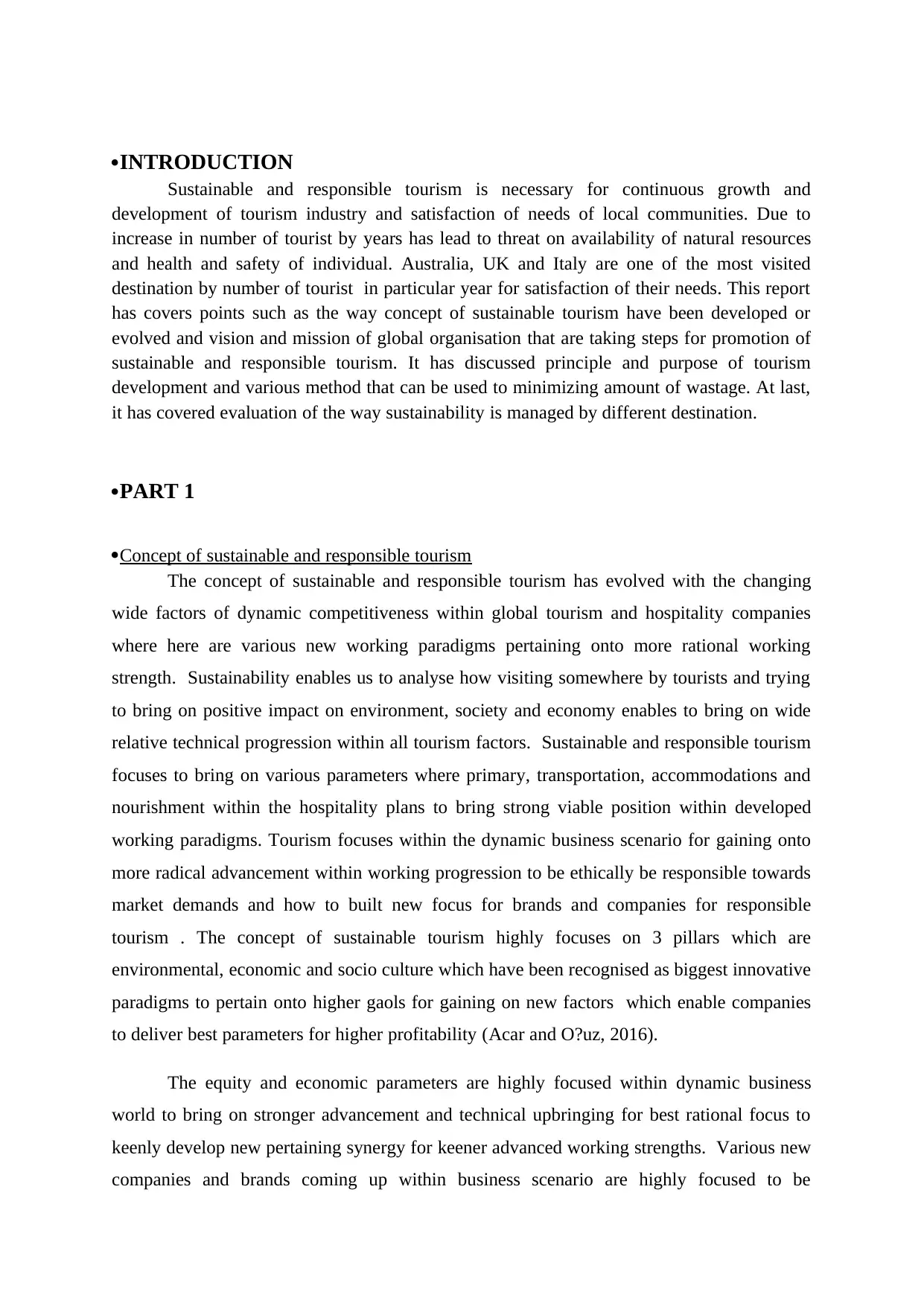
·INTRODUCTION
Sustainable and responsible tourism is necessary for continuous growth and
development of tourism industry and satisfaction of needs of local communities. Due to
increase in number of tourist by years has lead to threat on availability of natural resources
and health and safety of individual. Australia, UK and Italy are one of the most visited
destination by number of tourist in particular year for satisfaction of their needs. This report
has covers points such as the way concept of sustainable tourism have been developed or
evolved and vision and mission of global organisation that are taking steps for promotion of
sustainable and responsible tourism. It has discussed principle and purpose of tourism
development and various method that can be used to minimizing amount of wastage. At last,
it has covered evaluation of the way sustainability is managed by different destination.
·PART 1
·Concept of sustainable and responsible tourism
The concept of sustainable and responsible tourism has evolved with the changing
wide factors of dynamic competitiveness within global tourism and hospitality companies
where here are various new working paradigms pertaining onto more rational working
strength. Sustainability enables us to analyse how visiting somewhere by tourists and trying
to bring on positive impact on environment, society and economy enables to bring on wide
relative technical progression within all tourism factors. Sustainable and responsible tourism
focuses to bring on various parameters where primary, transportation, accommodations and
nourishment within the hospitality plans to bring strong viable position within developed
working paradigms. Tourism focuses within the dynamic business scenario for gaining onto
more radical advancement within working progression to be ethically be responsible towards
market demands and how to built new focus for brands and companies for responsible
tourism . The concept of sustainable tourism highly focuses on 3 pillars which are
environmental, economic and socio culture which have been recognised as biggest innovative
paradigms to pertain onto higher gaols for gaining on new factors which enable companies
to deliver best parameters for higher profitability (Acar and O?uz, 2016).
The equity and economic parameters are highly focused within dynamic business
world to bring on stronger advancement and technical upbringing for best rational focus to
keenly develop new pertaining synergy for keener advanced working strengths. Various new
companies and brands coming up within business scenario are highly focused to be
Sustainable and responsible tourism is necessary for continuous growth and
development of tourism industry and satisfaction of needs of local communities. Due to
increase in number of tourist by years has lead to threat on availability of natural resources
and health and safety of individual. Australia, UK and Italy are one of the most visited
destination by number of tourist in particular year for satisfaction of their needs. This report
has covers points such as the way concept of sustainable tourism have been developed or
evolved and vision and mission of global organisation that are taking steps for promotion of
sustainable and responsible tourism. It has discussed principle and purpose of tourism
development and various method that can be used to minimizing amount of wastage. At last,
it has covered evaluation of the way sustainability is managed by different destination.
·PART 1
·Concept of sustainable and responsible tourism
The concept of sustainable and responsible tourism has evolved with the changing
wide factors of dynamic competitiveness within global tourism and hospitality companies
where here are various new working paradigms pertaining onto more rational working
strength. Sustainability enables us to analyse how visiting somewhere by tourists and trying
to bring on positive impact on environment, society and economy enables to bring on wide
relative technical progression within all tourism factors. Sustainable and responsible tourism
focuses to bring on various parameters where primary, transportation, accommodations and
nourishment within the hospitality plans to bring strong viable position within developed
working paradigms. Tourism focuses within the dynamic business scenario for gaining onto
more radical advancement within working progression to be ethically be responsible towards
market demands and how to built new focus for brands and companies for responsible
tourism . The concept of sustainable tourism highly focuses on 3 pillars which are
environmental, economic and socio culture which have been recognised as biggest innovative
paradigms to pertain onto higher gaols for gaining on new factors which enable companies
to deliver best parameters for higher profitability (Acar and O?uz, 2016).
The equity and economic parameters are highly focused within dynamic business
world to bring on stronger advancement and technical upbringing for best rational focus to
keenly develop new pertaining synergy for keener advanced working strengths. Various new
companies and brands coming up within business scenario are highly focused to be
⊘ This is a preview!⊘
Do you want full access?
Subscribe today to unlock all pages.

Trusted by 1+ million students worldwide
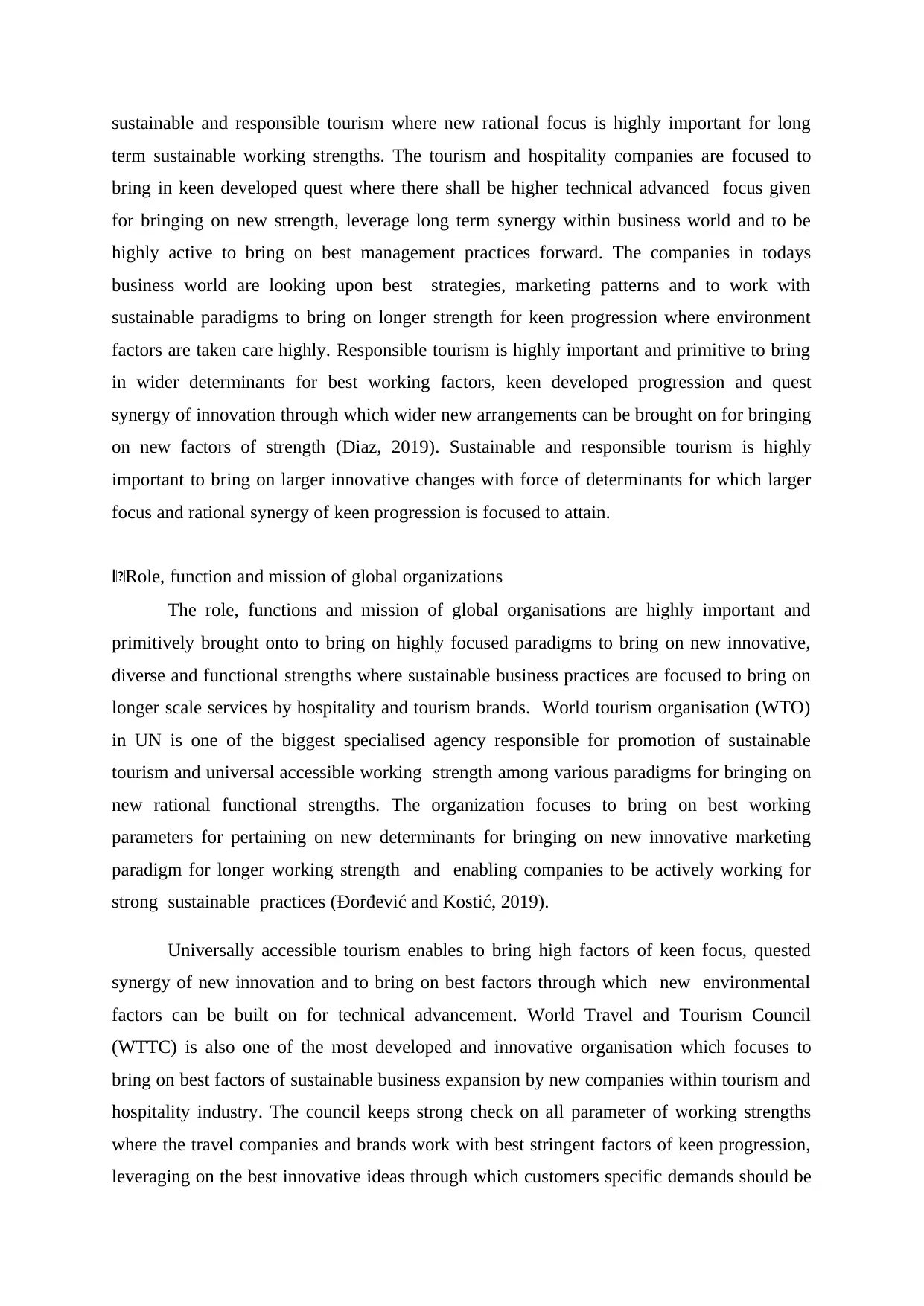
sustainable and responsible tourism where new rational focus is highly important for long
term sustainable working strengths. The tourism and hospitality companies are focused to
bring in keen developed quest where there shall be higher technical advanced focus given
for bringing on new strength, leverage long term synergy within business world and to be
highly active to bring on best management practices forward. The companies in todays
business world are looking upon best strategies, marketing patterns and to work with
sustainable paradigms to bring on longer strength for keen progression where environment
factors are taken care highly. Responsible tourism is highly important and primitive to bring
in wider determinants for best working factors, keen developed progression and quest
synergy of innovation through which wider new arrangements can be brought on for bringing
on new factors of strength (Diaz, 2019). Sustainable and responsible tourism is highly
important to bring on larger innovative changes with force of determinants for which larger
focus and rational synergy of keen progression is focused to attain.
l壱Role, function and mission of global organizations
The role, functions and mission of global organisations are highly important and
primitively brought onto to bring on highly focused paradigms to bring on new innovative,
diverse and functional strengths where sustainable business practices are focused to bring on
longer scale services by hospitality and tourism brands. World tourism organisation (WTO)
in UN is one of the biggest specialised agency responsible for promotion of sustainable
tourism and universal accessible working strength among various paradigms for bringing on
new rational functional strengths. The organization focuses to bring on best working
parameters for pertaining on new determinants for bringing on new innovative marketing
paradigm for longer working strength and enabling companies to be actively working for
strong sustainable practices (Đorđević and Kostić, 2019).
Universally accessible tourism enables to bring high factors of keen focus, quested
synergy of new innovation and to bring on best factors through which new environmental
factors can be built on for technical advancement. World Travel and Tourism Council
(WTTC) is also one of the most developed and innovative organisation which focuses to
bring on best factors of sustainable business expansion by new companies within tourism and
hospitality industry. The council keeps strong check on all parameter of working strengths
where the travel companies and brands work with best stringent factors of keen progression,
leveraging on the best innovative ideas through which customers specific demands should be
term sustainable working strengths. The tourism and hospitality companies are focused to
bring in keen developed quest where there shall be higher technical advanced focus given
for bringing on new strength, leverage long term synergy within business world and to be
highly active to bring on best management practices forward. The companies in todays
business world are looking upon best strategies, marketing patterns and to work with
sustainable paradigms to bring on longer strength for keen progression where environment
factors are taken care highly. Responsible tourism is highly important and primitive to bring
in wider determinants for best working factors, keen developed progression and quest
synergy of innovation through which wider new arrangements can be brought on for bringing
on new factors of strength (Diaz, 2019). Sustainable and responsible tourism is highly
important to bring on larger innovative changes with force of determinants for which larger
focus and rational synergy of keen progression is focused to attain.
l壱Role, function and mission of global organizations
The role, functions and mission of global organisations are highly important and
primitively brought onto to bring on highly focused paradigms to bring on new innovative,
diverse and functional strengths where sustainable business practices are focused to bring on
longer scale services by hospitality and tourism brands. World tourism organisation (WTO)
in UN is one of the biggest specialised agency responsible for promotion of sustainable
tourism and universal accessible working strength among various paradigms for bringing on
new rational functional strengths. The organization focuses to bring on best working
parameters for pertaining on new determinants for bringing on new innovative marketing
paradigm for longer working strength and enabling companies to be actively working for
strong sustainable practices (Đorđević and Kostić, 2019).
Universally accessible tourism enables to bring high factors of keen focus, quested
synergy of new innovation and to bring on best factors through which new environmental
factors can be built on for technical advancement. World Travel and Tourism Council
(WTTC) is also one of the most developed and innovative organisation which focuses to
bring on best factors of sustainable business expansion by new companies within tourism and
hospitality industry. The council keeps strong check on all parameter of working strengths
where the travel companies and brands work with best stringent factors of keen progression,
leveraging on the best innovative ideas through which customers specific demands should be
Paraphrase This Document
Need a fresh take? Get an instant paraphrase of this document with our AI Paraphraser
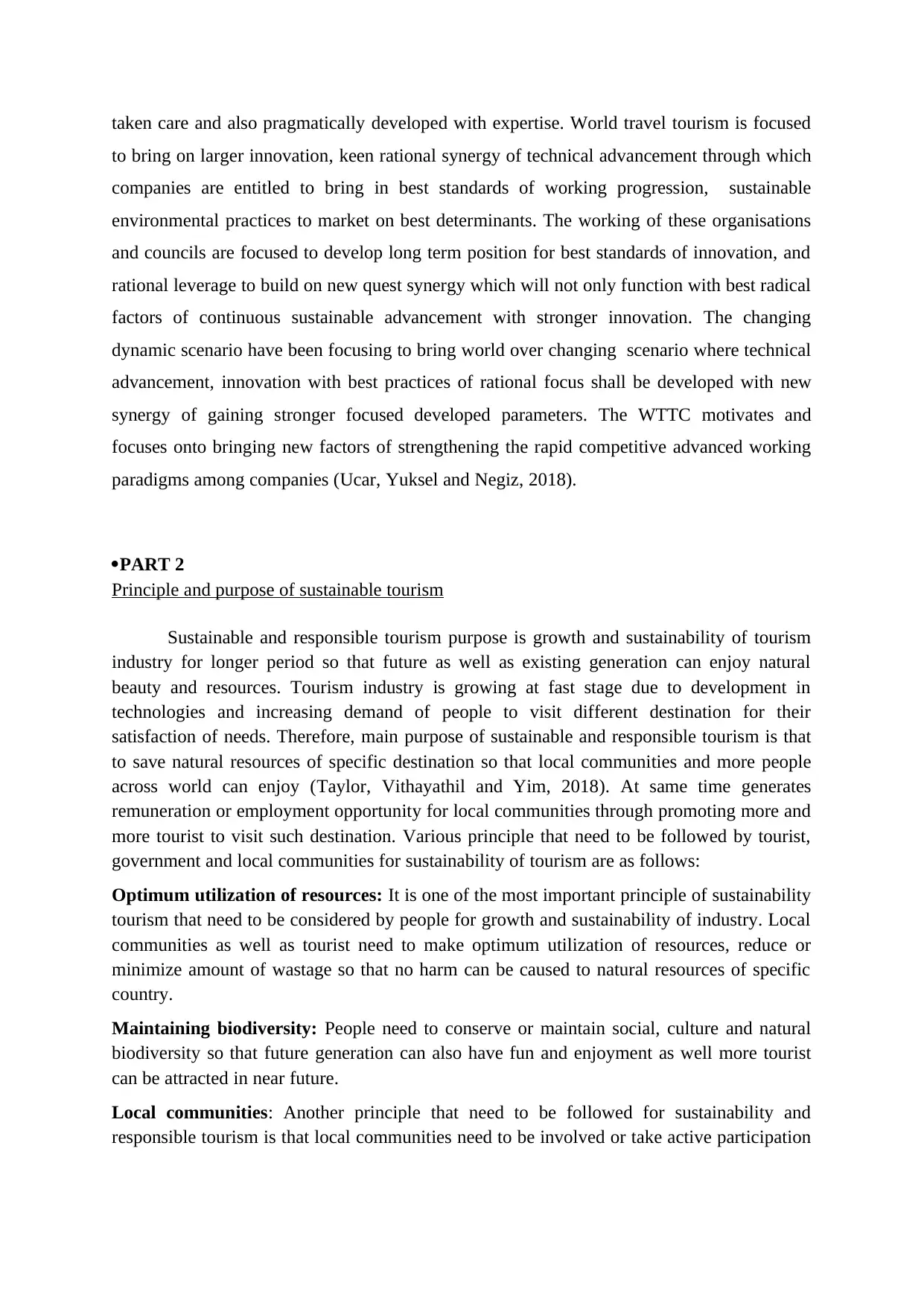
taken care and also pragmatically developed with expertise. World travel tourism is focused
to bring on larger innovation, keen rational synergy of technical advancement through which
companies are entitled to bring in best standards of working progression, sustainable
environmental practices to market on best determinants. The working of these organisations
and councils are focused to develop long term position for best standards of innovation, and
rational leverage to build on new quest synergy which will not only function with best radical
factors of continuous sustainable advancement with stronger innovation. The changing
dynamic scenario have been focusing to bring world over changing scenario where technical
advancement, innovation with best practices of rational focus shall be developed with new
synergy of gaining stronger focused developed parameters. The WTTC motivates and
focuses onto bringing new factors of strengthening the rapid competitive advanced working
paradigms among companies (Ucar, Yuksel and Negiz, 2018).
·PART 2
Principle and purpose of sustainable tourism
Sustainable and responsible tourism purpose is growth and sustainability of tourism
industry for longer period so that future as well as existing generation can enjoy natural
beauty and resources. Tourism industry is growing at fast stage due to development in
technologies and increasing demand of people to visit different destination for their
satisfaction of needs. Therefore, main purpose of sustainable and responsible tourism is that
to save natural resources of specific destination so that local communities and more people
across world can enjoy (Taylor, Vithayathil and Yim, 2018). At same time generates
remuneration or employment opportunity for local communities through promoting more and
more tourist to visit such destination. Various principle that need to be followed by tourist,
government and local communities for sustainability of tourism are as follows:
Optimum utilization of resources: It is one of the most important principle of sustainability
tourism that need to be considered by people for growth and sustainability of industry. Local
communities as well as tourist need to make optimum utilization of resources, reduce or
minimize amount of wastage so that no harm can be caused to natural resources of specific
country.
Maintaining biodiversity: People need to conserve or maintain social, culture and natural
biodiversity so that future generation can also have fun and enjoyment as well more tourist
can be attracted in near future.
Local communities: Another principle that need to be followed for sustainability and
responsible tourism is that local communities need to be involved or take active participation
to bring on larger innovation, keen rational synergy of technical advancement through which
companies are entitled to bring in best standards of working progression, sustainable
environmental practices to market on best determinants. The working of these organisations
and councils are focused to develop long term position for best standards of innovation, and
rational leverage to build on new quest synergy which will not only function with best radical
factors of continuous sustainable advancement with stronger innovation. The changing
dynamic scenario have been focusing to bring world over changing scenario where technical
advancement, innovation with best practices of rational focus shall be developed with new
synergy of gaining stronger focused developed parameters. The WTTC motivates and
focuses onto bringing new factors of strengthening the rapid competitive advanced working
paradigms among companies (Ucar, Yuksel and Negiz, 2018).
·PART 2
Principle and purpose of sustainable tourism
Sustainable and responsible tourism purpose is growth and sustainability of tourism
industry for longer period so that future as well as existing generation can enjoy natural
beauty and resources. Tourism industry is growing at fast stage due to development in
technologies and increasing demand of people to visit different destination for their
satisfaction of needs. Therefore, main purpose of sustainable and responsible tourism is that
to save natural resources of specific destination so that local communities and more people
across world can enjoy (Taylor, Vithayathil and Yim, 2018). At same time generates
remuneration or employment opportunity for local communities through promoting more and
more tourist to visit such destination. Various principle that need to be followed by tourist,
government and local communities for sustainability of tourism are as follows:
Optimum utilization of resources: It is one of the most important principle of sustainability
tourism that need to be considered by people for growth and sustainability of industry. Local
communities as well as tourist need to make optimum utilization of resources, reduce or
minimize amount of wastage so that no harm can be caused to natural resources of specific
country.
Maintaining biodiversity: People need to conserve or maintain social, culture and natural
biodiversity so that future generation can also have fun and enjoyment as well more tourist
can be attracted in near future.
Local communities: Another principle that need to be followed for sustainability and
responsible tourism is that local communities need to be involved or take active participation
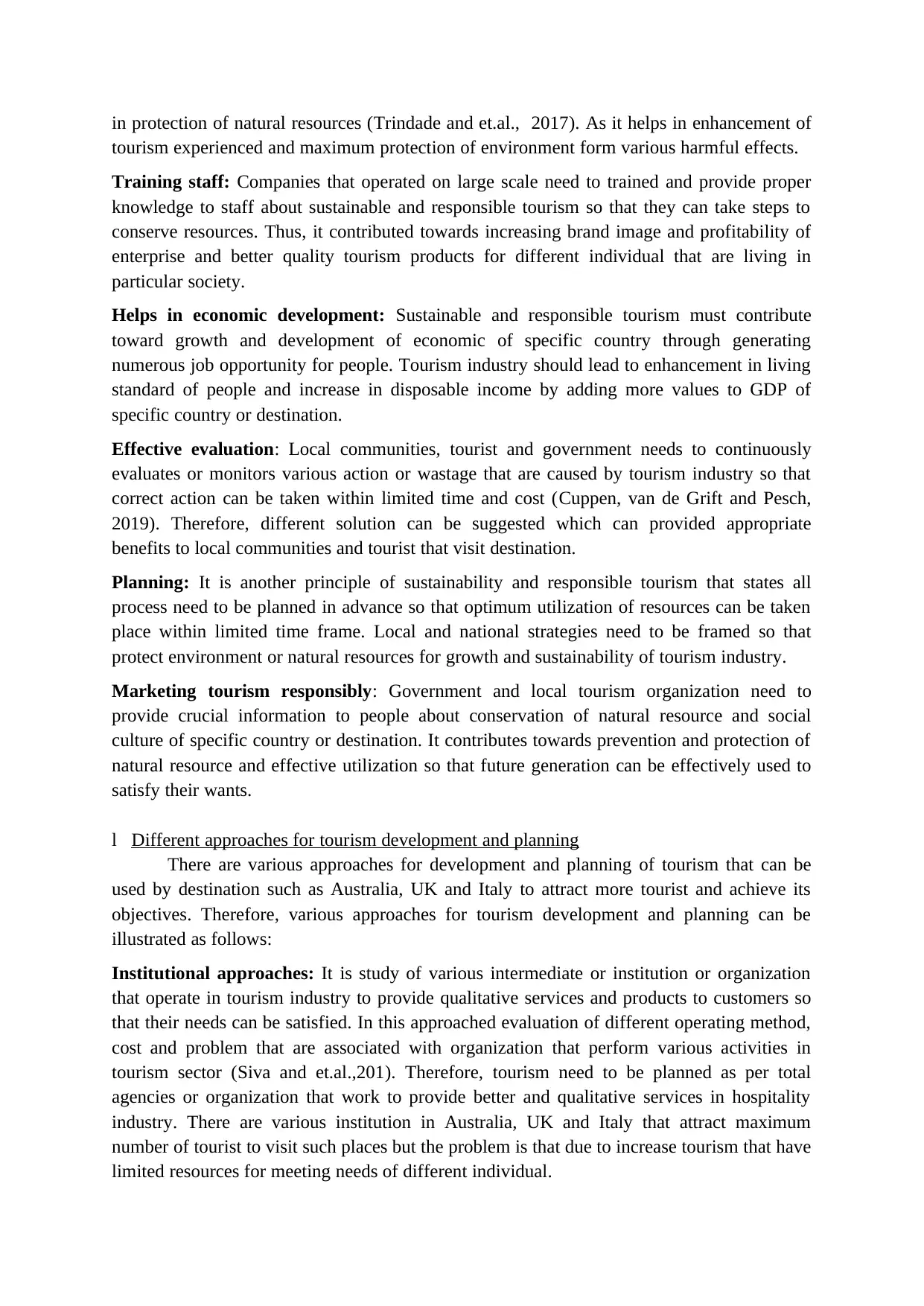
in protection of natural resources (Trindade and et.al., 2017). As it helps in enhancement of
tourism experienced and maximum protection of environment form various harmful effects.
Training staff: Companies that operated on large scale need to trained and provide proper
knowledge to staff about sustainable and responsible tourism so that they can take steps to
conserve resources. Thus, it contributed towards increasing brand image and profitability of
enterprise and better quality tourism products for different individual that are living in
particular society.
Helps in economic development: Sustainable and responsible tourism must contribute
toward growth and development of economic of specific country through generating
numerous job opportunity for people. Tourism industry should lead to enhancement in living
standard of people and increase in disposable income by adding more values to GDP of
specific country or destination.
Effective evaluation: Local communities, tourist and government needs to continuously
evaluates or monitors various action or wastage that are caused by tourism industry so that
correct action can be taken within limited time and cost (Cuppen, van de Grift and Pesch,
2019). Therefore, different solution can be suggested which can provided appropriate
benefits to local communities and tourist that visit destination.
Planning: It is another principle of sustainability and responsible tourism that states all
process need to be planned in advance so that optimum utilization of resources can be taken
place within limited time frame. Local and national strategies need to be framed so that
protect environment or natural resources for growth and sustainability of tourism industry.
Marketing tourism responsibly: Government and local tourism organization need to
provide crucial information to people about conservation of natural resource and social
culture of specific country or destination. It contributes towards prevention and protection of
natural resource and effective utilization so that future generation can be effectively used to
satisfy their wants.
l壱Different approaches for tourism development and planning
There are various approaches for development and planning of tourism that can be
used by destination such as Australia, UK and Italy to attract more tourist and achieve its
objectives. Therefore, various approaches for tourism development and planning can be
illustrated as follows:
Institutional approaches: It is study of various intermediate or institution or organization
that operate in tourism industry to provide qualitative services and products to customers so
that their needs can be satisfied. In this approached evaluation of different operating method,
cost and problem that are associated with organization that perform various activities in
tourism sector (Siva and et.al.,201). Therefore, tourism need to be planned as per total
agencies or organization that work to provide better and qualitative services in hospitality
industry. There are various institution in Australia, UK and Italy that attract maximum
number of tourist to visit such places but the problem is that due to increase tourism that have
limited resources for meeting needs of different individual.
tourism experienced and maximum protection of environment form various harmful effects.
Training staff: Companies that operated on large scale need to trained and provide proper
knowledge to staff about sustainable and responsible tourism so that they can take steps to
conserve resources. Thus, it contributed towards increasing brand image and profitability of
enterprise and better quality tourism products for different individual that are living in
particular society.
Helps in economic development: Sustainable and responsible tourism must contribute
toward growth and development of economic of specific country through generating
numerous job opportunity for people. Tourism industry should lead to enhancement in living
standard of people and increase in disposable income by adding more values to GDP of
specific country or destination.
Effective evaluation: Local communities, tourist and government needs to continuously
evaluates or monitors various action or wastage that are caused by tourism industry so that
correct action can be taken within limited time and cost (Cuppen, van de Grift and Pesch,
2019). Therefore, different solution can be suggested which can provided appropriate
benefits to local communities and tourist that visit destination.
Planning: It is another principle of sustainability and responsible tourism that states all
process need to be planned in advance so that optimum utilization of resources can be taken
place within limited time frame. Local and national strategies need to be framed so that
protect environment or natural resources for growth and sustainability of tourism industry.
Marketing tourism responsibly: Government and local tourism organization need to
provide crucial information to people about conservation of natural resource and social
culture of specific country or destination. It contributes towards prevention and protection of
natural resource and effective utilization so that future generation can be effectively used to
satisfy their wants.
l壱Different approaches for tourism development and planning
There are various approaches for development and planning of tourism that can be
used by destination such as Australia, UK and Italy to attract more tourist and achieve its
objectives. Therefore, various approaches for tourism development and planning can be
illustrated as follows:
Institutional approaches: It is study of various intermediate or institution or organization
that operate in tourism industry to provide qualitative services and products to customers so
that their needs can be satisfied. In this approached evaluation of different operating method,
cost and problem that are associated with organization that perform various activities in
tourism sector (Siva and et.al.,201). Therefore, tourism need to be planned as per total
agencies or organization that work to provide better and qualitative services in hospitality
industry. There are various institution in Australia, UK and Italy that attract maximum
number of tourist to visit such places but the problem is that due to increase tourism that have
limited resources for meeting needs of different individual.
⊘ This is a preview!⊘
Do you want full access?
Subscribe today to unlock all pages.

Trusted by 1+ million students worldwide
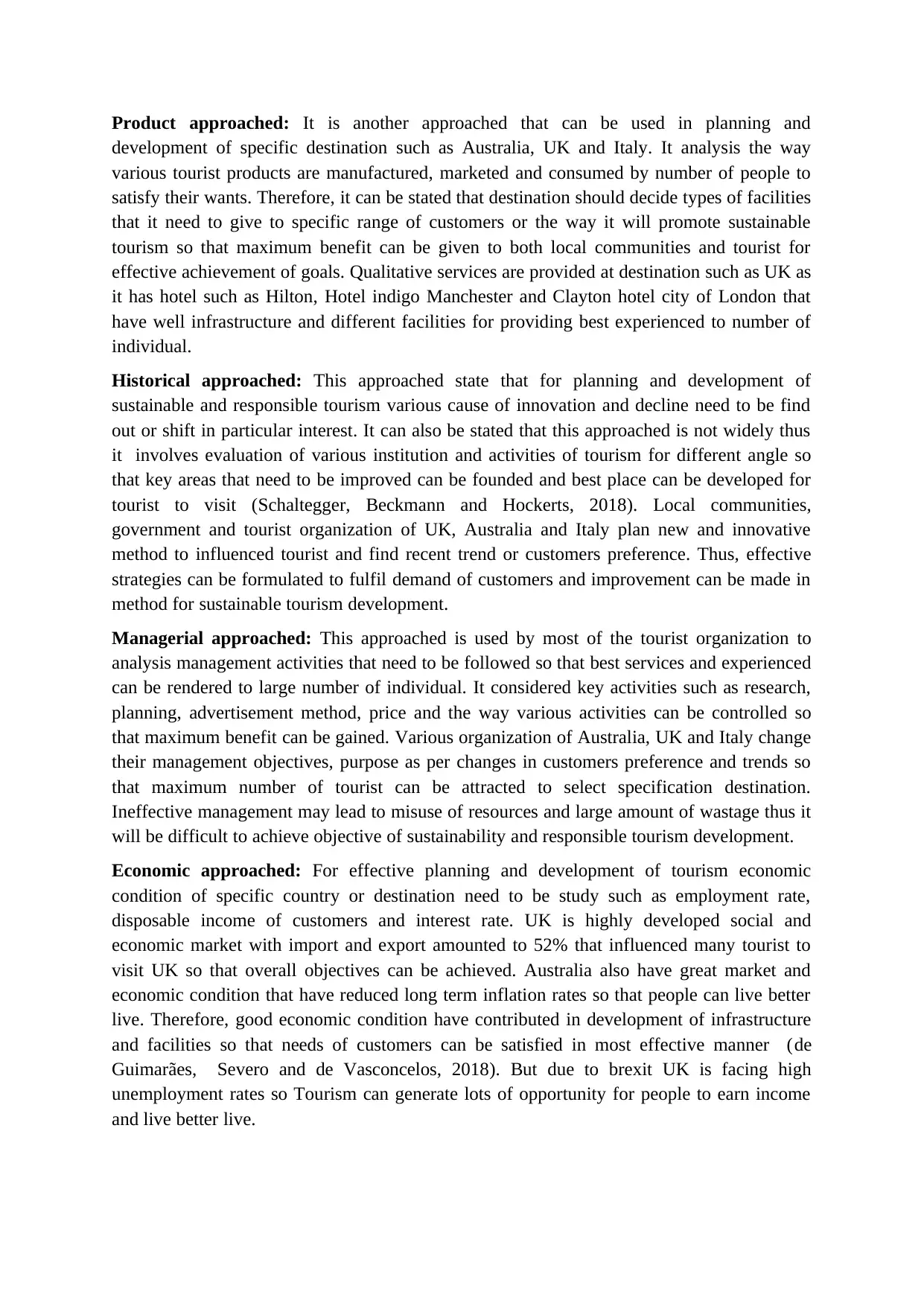
Product approached: It is another approached that can be used in planning and
development of specific destination such as Australia, UK and Italy. It analysis the way
various tourist products are manufactured, marketed and consumed by number of people to
satisfy their wants. Therefore, it can be stated that destination should decide types of facilities
that it need to give to specific range of customers or the way it will promote sustainable
tourism so that maximum benefit can be given to both local communities and tourist for
effective achievement of goals. Qualitative services are provided at destination such as UK as
it has hotel such as Hilton, Hotel indigo Manchester and Clayton hotel city of London that
have well infrastructure and different facilities for providing best experienced to number of
individual.
Historical approached: This approached state that for planning and development of
sustainable and responsible tourism various cause of innovation and decline need to be find
out or shift in particular interest. It can also be stated that this approached is not widely thus
it involves evaluation of various institution and activities of tourism for different angle so
that key areas that need to be improved can be founded and best place can be developed for
tourist to visit (Schaltegger, Beckmann and Hockerts, 2018). Local communities,
government and tourist organization of UK, Australia and Italy plan new and innovative
method to influenced tourist and find recent trend or customers preference. Thus, effective
strategies can be formulated to fulfil demand of customers and improvement can be made in
method for sustainable tourism development.
Managerial approached: This approached is used by most of the tourist organization to
analysis management activities that need to be followed so that best services and experienced
can be rendered to large number of individual. It considered key activities such as research,
planning, advertisement method, price and the way various activities can be controlled so
that maximum benefit can be gained. Various organization of Australia, UK and Italy change
their management objectives, purpose as per changes in customers preference and trends so
that maximum number of tourist can be attracted to select specification destination.
Ineffective management may lead to misuse of resources and large amount of wastage thus it
will be difficult to achieve objective of sustainability and responsible tourism development.
Economic approached: For effective planning and development of tourism economic
condition of specific country or destination need to be study such as employment rate,
disposable income of customers and interest rate. UK is highly developed social and
economic market with import and export amounted to 52% that influenced many tourist to
visit UK so that overall objectives can be achieved. Australia also have great market and
economic condition that have reduced long term inflation rates so that people can live better
live. Therefore, good economic condition have contributed in development of infrastructure
and facilities so that needs of customers can be satisfied in most effective manner (de
Guimarães, Severo and de Vasconcelos, 2018). But due to brexit UK is facing high
unemployment rates so Tourism can generate lots of opportunity for people to earn income
and live better live.
development of specific destination such as Australia, UK and Italy. It analysis the way
various tourist products are manufactured, marketed and consumed by number of people to
satisfy their wants. Therefore, it can be stated that destination should decide types of facilities
that it need to give to specific range of customers or the way it will promote sustainable
tourism so that maximum benefit can be given to both local communities and tourist for
effective achievement of goals. Qualitative services are provided at destination such as UK as
it has hotel such as Hilton, Hotel indigo Manchester and Clayton hotel city of London that
have well infrastructure and different facilities for providing best experienced to number of
individual.
Historical approached: This approached state that for planning and development of
sustainable and responsible tourism various cause of innovation and decline need to be find
out or shift in particular interest. It can also be stated that this approached is not widely thus
it involves evaluation of various institution and activities of tourism for different angle so
that key areas that need to be improved can be founded and best place can be developed for
tourist to visit (Schaltegger, Beckmann and Hockerts, 2018). Local communities,
government and tourist organization of UK, Australia and Italy plan new and innovative
method to influenced tourist and find recent trend or customers preference. Thus, effective
strategies can be formulated to fulfil demand of customers and improvement can be made in
method for sustainable tourism development.
Managerial approached: This approached is used by most of the tourist organization to
analysis management activities that need to be followed so that best services and experienced
can be rendered to large number of individual. It considered key activities such as research,
planning, advertisement method, price and the way various activities can be controlled so
that maximum benefit can be gained. Various organization of Australia, UK and Italy change
their management objectives, purpose as per changes in customers preference and trends so
that maximum number of tourist can be attracted to select specification destination.
Ineffective management may lead to misuse of resources and large amount of wastage thus it
will be difficult to achieve objective of sustainability and responsible tourism development.
Economic approached: For effective planning and development of tourism economic
condition of specific country or destination need to be study such as employment rate,
disposable income of customers and interest rate. UK is highly developed social and
economic market with import and export amounted to 52% that influenced many tourist to
visit UK so that overall objectives can be achieved. Australia also have great market and
economic condition that have reduced long term inflation rates so that people can live better
live. Therefore, good economic condition have contributed in development of infrastructure
and facilities so that needs of customers can be satisfied in most effective manner (de
Guimarães, Severo and de Vasconcelos, 2018). But due to brexit UK is facing high
unemployment rates so Tourism can generate lots of opportunity for people to earn income
and live better live.
Paraphrase This Document
Need a fresh take? Get an instant paraphrase of this document with our AI Paraphraser
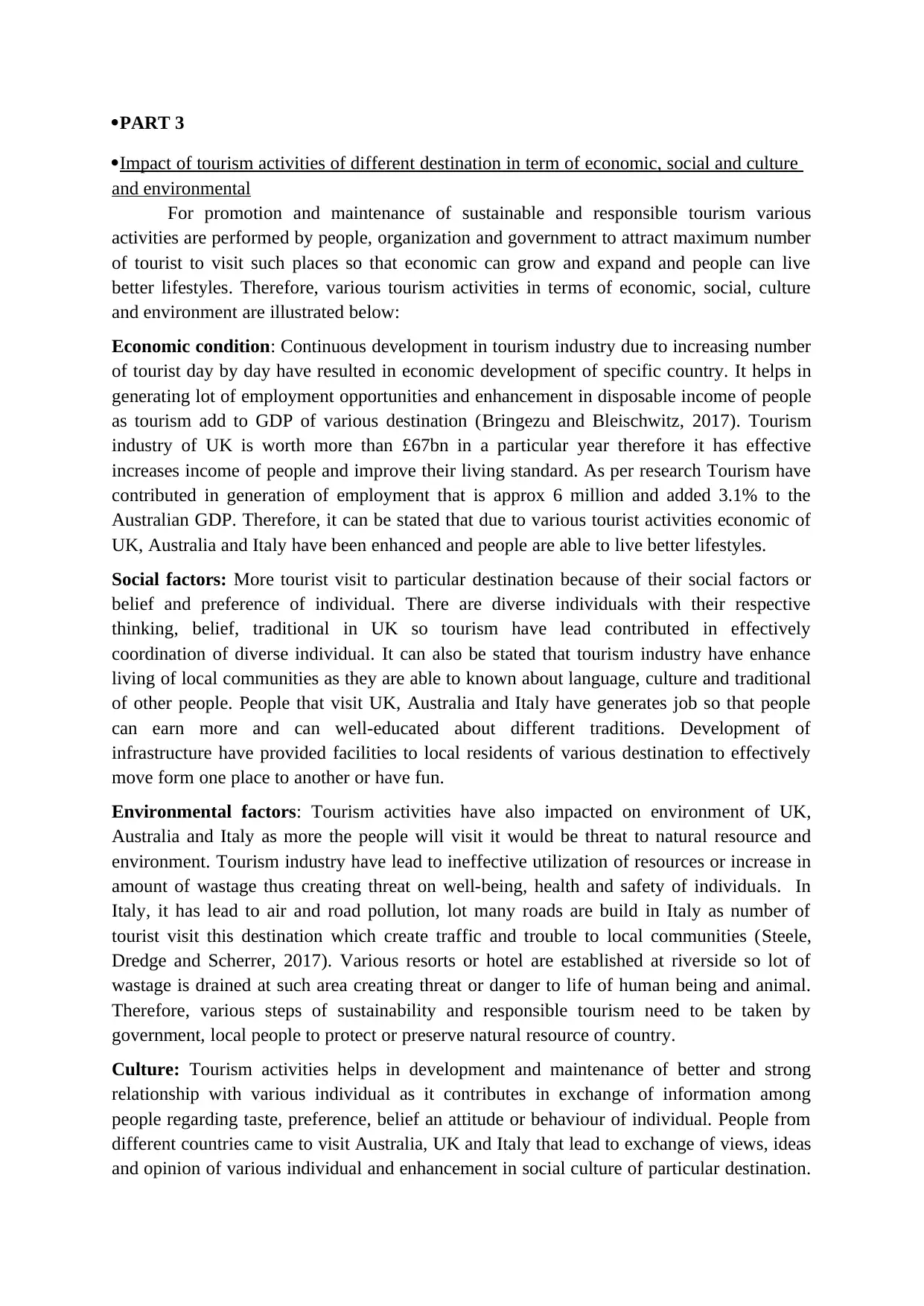
·PART 3
·Impact of tourism activities of different destination in term of economic, social and culture
and environmental
For promotion and maintenance of sustainable and responsible tourism various
activities are performed by people, organization and government to attract maximum number
of tourist to visit such places so that economic can grow and expand and people can live
better lifestyles. Therefore, various tourism activities in terms of economic, social, culture
and environment are illustrated below:
Economic condition: Continuous development in tourism industry due to increasing number
of tourist day by day have resulted in economic development of specific country. It helps in
generating lot of employment opportunities and enhancement in disposable income of people
as tourism add to GDP of various destination (Bringezu and Bleischwitz, 2017). Tourism
industry of UK is worth more than £67bn in a particular year therefore it has effective
increases income of people and improve their living standard. As per research Tourism have
contributed in generation of employment that is approx 6 million and added 3.1% to the
Australian GDP. Therefore, it can be stated that due to various tourist activities economic of
UK, Australia and Italy have been enhanced and people are able to live better lifestyles.
Social factors: More tourist visit to particular destination because of their social factors or
belief and preference of individual. There are diverse individuals with their respective
thinking, belief, traditional in UK so tourism have lead contributed in effectively
coordination of diverse individual. It can also be stated that tourism industry have enhance
living of local communities as they are able to known about language, culture and traditional
of other people. People that visit UK, Australia and Italy have generates job so that people
can earn more and can well-educated about different traditions. Development of
infrastructure have provided facilities to local residents of various destination to effectively
move form one place to another or have fun.
Environmental factors: Tourism activities have also impacted on environment of UK,
Australia and Italy as more the people will visit it would be threat to natural resource and
environment. Tourism industry have lead to ineffective utilization of resources or increase in
amount of wastage thus creating threat on well-being, health and safety of individuals. In
Italy, it has lead to air and road pollution, lot many roads are build in Italy as number of
tourist visit this destination which create traffic and trouble to local communities (Steele,
Dredge and Scherrer, 2017). Various resorts or hotel are established at riverside so lot of
wastage is drained at such area creating threat or danger to life of human being and animal.
Therefore, various steps of sustainability and responsible tourism need to be taken by
government, local people to protect or preserve natural resource of country.
Culture: Tourism activities helps in development and maintenance of better and strong
relationship with various individual as it contributes in exchange of information among
people regarding taste, preference, belief an attitude or behaviour of individual. People from
different countries came to visit Australia, UK and Italy that lead to exchange of views, ideas
and opinion of various individual and enhancement in social culture of particular destination.
·Impact of tourism activities of different destination in term of economic, social and culture
and environmental
For promotion and maintenance of sustainable and responsible tourism various
activities are performed by people, organization and government to attract maximum number
of tourist to visit such places so that economic can grow and expand and people can live
better lifestyles. Therefore, various tourism activities in terms of economic, social, culture
and environment are illustrated below:
Economic condition: Continuous development in tourism industry due to increasing number
of tourist day by day have resulted in economic development of specific country. It helps in
generating lot of employment opportunities and enhancement in disposable income of people
as tourism add to GDP of various destination (Bringezu and Bleischwitz, 2017). Tourism
industry of UK is worth more than £67bn in a particular year therefore it has effective
increases income of people and improve their living standard. As per research Tourism have
contributed in generation of employment that is approx 6 million and added 3.1% to the
Australian GDP. Therefore, it can be stated that due to various tourist activities economic of
UK, Australia and Italy have been enhanced and people are able to live better lifestyles.
Social factors: More tourist visit to particular destination because of their social factors or
belief and preference of individual. There are diverse individuals with their respective
thinking, belief, traditional in UK so tourism have lead contributed in effectively
coordination of diverse individual. It can also be stated that tourism industry have enhance
living of local communities as they are able to known about language, culture and traditional
of other people. People that visit UK, Australia and Italy have generates job so that people
can earn more and can well-educated about different traditions. Development of
infrastructure have provided facilities to local residents of various destination to effectively
move form one place to another or have fun.
Environmental factors: Tourism activities have also impacted on environment of UK,
Australia and Italy as more the people will visit it would be threat to natural resource and
environment. Tourism industry have lead to ineffective utilization of resources or increase in
amount of wastage thus creating threat on well-being, health and safety of individuals. In
Italy, it has lead to air and road pollution, lot many roads are build in Italy as number of
tourist visit this destination which create traffic and trouble to local communities (Steele,
Dredge and Scherrer, 2017). Various resorts or hotel are established at riverside so lot of
wastage is drained at such area creating threat or danger to life of human being and animal.
Therefore, various steps of sustainability and responsible tourism need to be taken by
government, local people to protect or preserve natural resource of country.
Culture: Tourism activities helps in development and maintenance of better and strong
relationship with various individual as it contributes in exchange of information among
people regarding taste, preference, belief an attitude or behaviour of individual. People from
different countries came to visit Australia, UK and Italy that lead to exchange of views, ideas
and opinion of various individual and enhancement in social culture of particular destination.
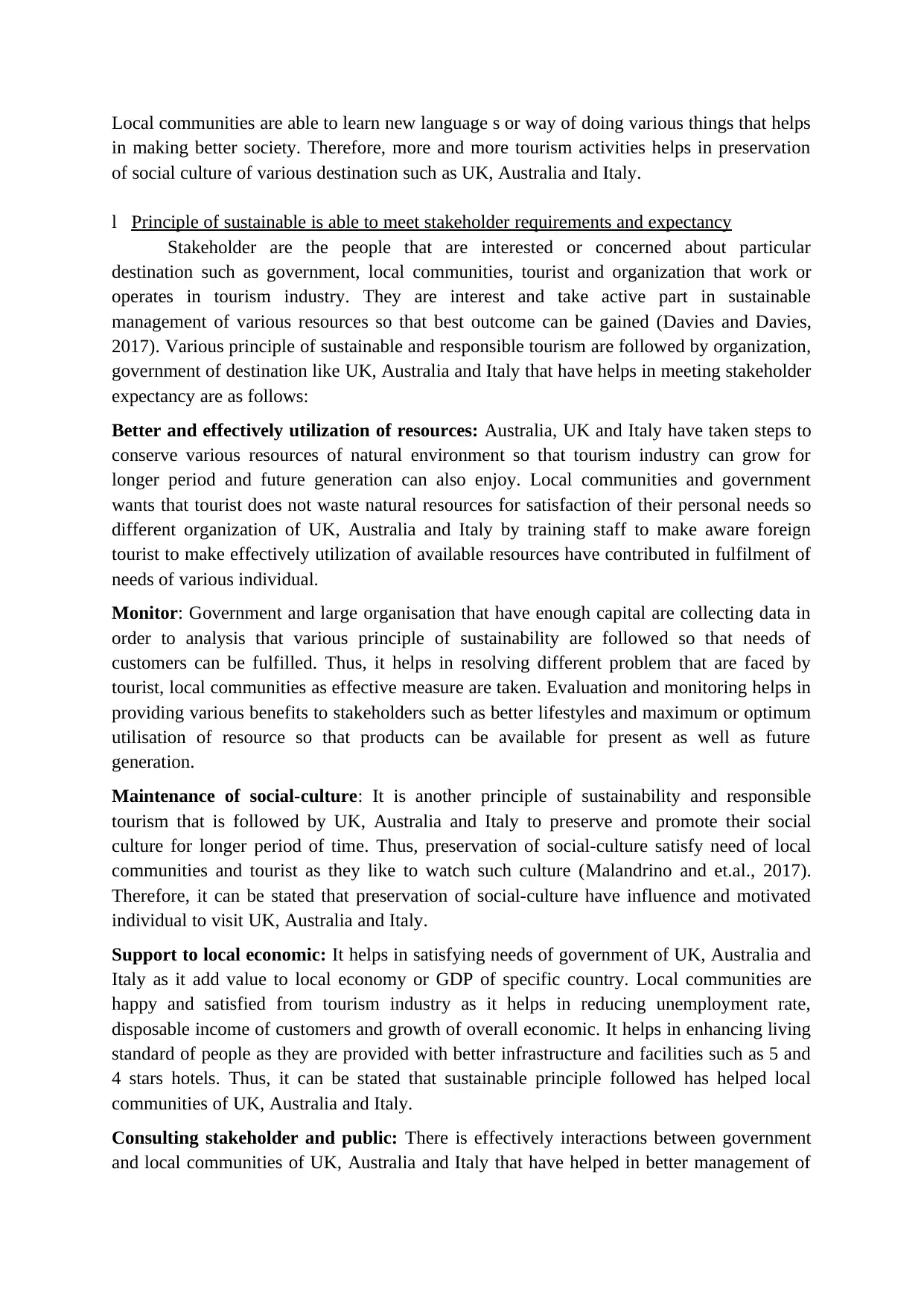
Local communities are able to learn new language s or way of doing various things that helps
in making better society. Therefore, more and more tourism activities helps in preservation
of social culture of various destination such as UK, Australia and Italy.
l壱Principle of sustainable is able to meet stakeholder requirements and expectancy
Stakeholder are the people that are interested or concerned about particular
destination such as government, local communities, tourist and organization that work or
operates in tourism industry. They are interest and take active part in sustainable
management of various resources so that best outcome can be gained (Davies and Davies,
2017). Various principle of sustainable and responsible tourism are followed by organization,
government of destination like UK, Australia and Italy that have helps in meeting stakeholder
expectancy are as follows:
Better and effectively utilization of resources: Australia, UK and Italy have taken steps to
conserve various resources of natural environment so that tourism industry can grow for
longer period and future generation can also enjoy. Local communities and government
wants that tourist does not waste natural resources for satisfaction of their personal needs so
different organization of UK, Australia and Italy by training staff to make aware foreign
tourist to make effectively utilization of available resources have contributed in fulfilment of
needs of various individual.
Monitor: Government and large organisation that have enough capital are collecting data in
order to analysis that various principle of sustainability are followed so that needs of
customers can be fulfilled. Thus, it helps in resolving different problem that are faced by
tourist, local communities as effective measure are taken. Evaluation and monitoring helps in
providing various benefits to stakeholders such as better lifestyles and maximum or optimum
utilisation of resource so that products can be available for present as well as future
generation.
Maintenance of social-culture: It is another principle of sustainability and responsible
tourism that is followed by UK, Australia and Italy to preserve and promote their social
culture for longer period of time. Thus, preservation of social-culture satisfy need of local
communities and tourist as they like to watch such culture (Malandrino and et.al., 2017).
Therefore, it can be stated that preservation of social-culture have influence and motivated
individual to visit UK, Australia and Italy.
Support to local economic: It helps in satisfying needs of government of UK, Australia and
Italy as it add value to local economy or GDP of specific country. Local communities are
happy and satisfied from tourism industry as it helps in reducing unemployment rate,
disposable income of customers and growth of overall economic. It helps in enhancing living
standard of people as they are provided with better infrastructure and facilities such as 5 and
4 stars hotels. Thus, it can be stated that sustainable principle followed has helped local
communities of UK, Australia and Italy.
Consulting stakeholder and public: There is effectively interactions between government
and local communities of UK, Australia and Italy that have helped in better management of
in making better society. Therefore, more and more tourism activities helps in preservation
of social culture of various destination such as UK, Australia and Italy.
l壱Principle of sustainable is able to meet stakeholder requirements and expectancy
Stakeholder are the people that are interested or concerned about particular
destination such as government, local communities, tourist and organization that work or
operates in tourism industry. They are interest and take active part in sustainable
management of various resources so that best outcome can be gained (Davies and Davies,
2017). Various principle of sustainable and responsible tourism are followed by organization,
government of destination like UK, Australia and Italy that have helps in meeting stakeholder
expectancy are as follows:
Better and effectively utilization of resources: Australia, UK and Italy have taken steps to
conserve various resources of natural environment so that tourism industry can grow for
longer period and future generation can also enjoy. Local communities and government
wants that tourist does not waste natural resources for satisfaction of their personal needs so
different organization of UK, Australia and Italy by training staff to make aware foreign
tourist to make effectively utilization of available resources have contributed in fulfilment of
needs of various individual.
Monitor: Government and large organisation that have enough capital are collecting data in
order to analysis that various principle of sustainability are followed so that needs of
customers can be fulfilled. Thus, it helps in resolving different problem that are faced by
tourist, local communities as effective measure are taken. Evaluation and monitoring helps in
providing various benefits to stakeholders such as better lifestyles and maximum or optimum
utilisation of resource so that products can be available for present as well as future
generation.
Maintenance of social-culture: It is another principle of sustainability and responsible
tourism that is followed by UK, Australia and Italy to preserve and promote their social
culture for longer period of time. Thus, preservation of social-culture satisfy need of local
communities and tourist as they like to watch such culture (Malandrino and et.al., 2017).
Therefore, it can be stated that preservation of social-culture have influence and motivated
individual to visit UK, Australia and Italy.
Support to local economic: It helps in satisfying needs of government of UK, Australia and
Italy as it add value to local economy or GDP of specific country. Local communities are
happy and satisfied from tourism industry as it helps in reducing unemployment rate,
disposable income of customers and growth of overall economic. It helps in enhancing living
standard of people as they are provided with better infrastructure and facilities such as 5 and
4 stars hotels. Thus, it can be stated that sustainable principle followed has helped local
communities of UK, Australia and Italy.
Consulting stakeholder and public: There is effectively interactions between government
and local communities of UK, Australia and Italy that have helped in better management of
⊘ This is a preview!⊘
Do you want full access?
Subscribe today to unlock all pages.

Trusted by 1+ million students worldwide
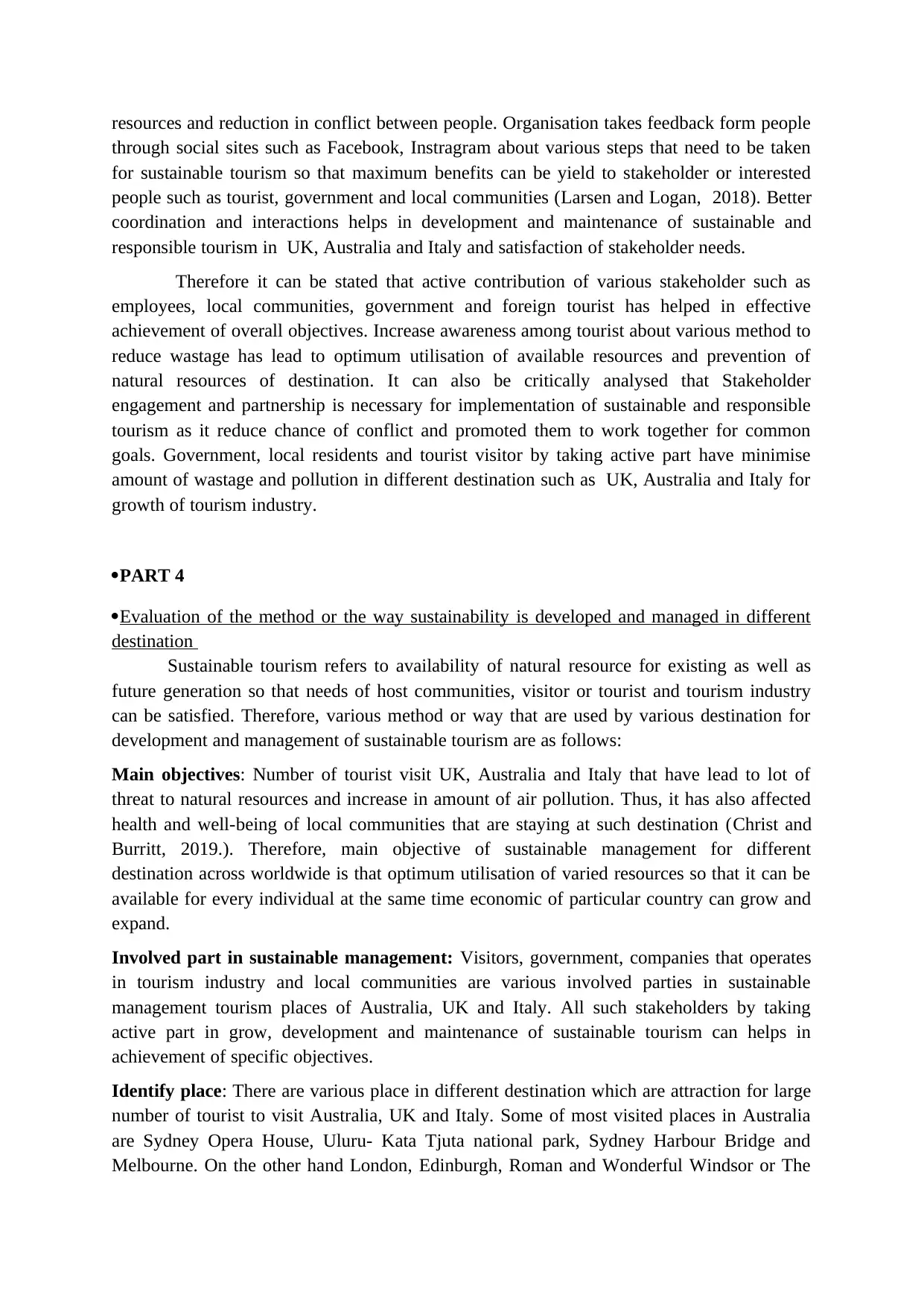
resources and reduction in conflict between people. Organisation takes feedback form people
through social sites such as Facebook, Instragram about various steps that need to be taken
for sustainable tourism so that maximum benefits can be yield to stakeholder or interested
people such as tourist, government and local communities (Larsen and Logan, 2018). Better
coordination and interactions helps in development and maintenance of sustainable and
responsible tourism in UK, Australia and Italy and satisfaction of stakeholder needs.
Therefore it can be stated that active contribution of various stakeholder such as
employees, local communities, government and foreign tourist has helped in effective
achievement of overall objectives. Increase awareness among tourist about various method to
reduce wastage has lead to optimum utilisation of available resources and prevention of
natural resources of destination. It can also be critically analysed that Stakeholder
engagement and partnership is necessary for implementation of sustainable and responsible
tourism as it reduce chance of conflict and promoted them to work together for common
goals. Government, local residents and tourist visitor by taking active part have minimise
amount of wastage and pollution in different destination such as UK, Australia and Italy for
growth of tourism industry.
·PART 4
·Evaluation of the method or the way sustainability is developed and managed in different
destination
Sustainable tourism refers to availability of natural resource for existing as well as
future generation so that needs of host communities, visitor or tourist and tourism industry
can be satisfied. Therefore, various method or way that are used by various destination for
development and management of sustainable tourism are as follows:
Main objectives: Number of tourist visit UK, Australia and Italy that have lead to lot of
threat to natural resources and increase in amount of air pollution. Thus, it has also affected
health and well-being of local communities that are staying at such destination (Christ and
Burritt, 2019.). Therefore, main objective of sustainable management for different
destination across worldwide is that optimum utilisation of varied resources so that it can be
available for every individual at the same time economic of particular country can grow and
expand.
Involved part in sustainable management: Visitors, government, companies that operates
in tourism industry and local communities are various involved parties in sustainable
management tourism places of Australia, UK and Italy. All such stakeholders by taking
active part in grow, development and maintenance of sustainable tourism can helps in
achievement of specific objectives.
Identify place: There are various place in different destination which are attraction for large
number of tourist to visit Australia, UK and Italy. Some of most visited places in Australia
are Sydney Opera House, Uluru- Kata Tjuta national park, Sydney Harbour Bridge and
Melbourne. On the other hand London, Edinburgh, Roman and Wonderful Windsor or The
through social sites such as Facebook, Instragram about various steps that need to be taken
for sustainable tourism so that maximum benefits can be yield to stakeholder or interested
people such as tourist, government and local communities (Larsen and Logan, 2018). Better
coordination and interactions helps in development and maintenance of sustainable and
responsible tourism in UK, Australia and Italy and satisfaction of stakeholder needs.
Therefore it can be stated that active contribution of various stakeholder such as
employees, local communities, government and foreign tourist has helped in effective
achievement of overall objectives. Increase awareness among tourist about various method to
reduce wastage has lead to optimum utilisation of available resources and prevention of
natural resources of destination. It can also be critically analysed that Stakeholder
engagement and partnership is necessary for implementation of sustainable and responsible
tourism as it reduce chance of conflict and promoted them to work together for common
goals. Government, local residents and tourist visitor by taking active part have minimise
amount of wastage and pollution in different destination such as UK, Australia and Italy for
growth of tourism industry.
·PART 4
·Evaluation of the method or the way sustainability is developed and managed in different
destination
Sustainable tourism refers to availability of natural resource for existing as well as
future generation so that needs of host communities, visitor or tourist and tourism industry
can be satisfied. Therefore, various method or way that are used by various destination for
development and management of sustainable tourism are as follows:
Main objectives: Number of tourist visit UK, Australia and Italy that have lead to lot of
threat to natural resources and increase in amount of air pollution. Thus, it has also affected
health and well-being of local communities that are staying at such destination (Christ and
Burritt, 2019.). Therefore, main objective of sustainable management for different
destination across worldwide is that optimum utilisation of varied resources so that it can be
available for every individual at the same time economic of particular country can grow and
expand.
Involved part in sustainable management: Visitors, government, companies that operates
in tourism industry and local communities are various involved parties in sustainable
management tourism places of Australia, UK and Italy. All such stakeholders by taking
active part in grow, development and maintenance of sustainable tourism can helps in
achievement of specific objectives.
Identify place: There are various place in different destination which are attraction for large
number of tourist to visit Australia, UK and Italy. Some of most visited places in Australia
are Sydney Opera House, Uluru- Kata Tjuta national park, Sydney Harbour Bridge and
Melbourne. On the other hand London, Edinburgh, Roman and Wonderful Windsor or The
Paraphrase This Document
Need a fresh take? Get an instant paraphrase of this document with our AI Paraphraser
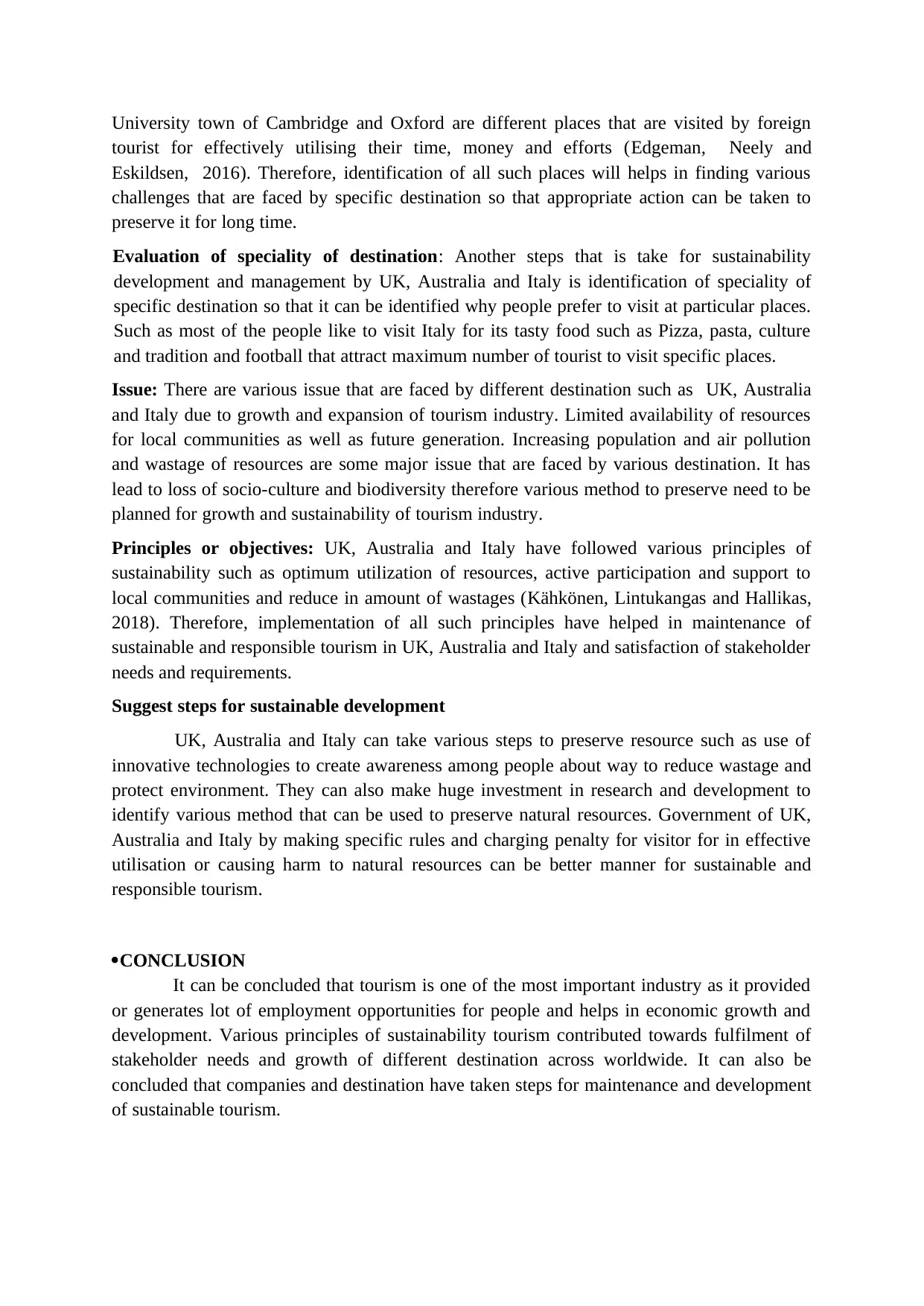
University town of Cambridge and Oxford are different places that are visited by foreign
tourist for effectively utilising their time, money and efforts (Edgeman, Neely and
Eskildsen, 2016). Therefore, identification of all such places will helps in finding various
challenges that are faced by specific destination so that appropriate action can be taken to
preserve it for long time.
Evaluation of speciality of destination: Another steps that is take for sustainability
development and management by UK, Australia and Italy is identification of speciality of
specific destination so that it can be identified why people prefer to visit at particular places.
Such as most of the people like to visit Italy for its tasty food such as Pizza, pasta, culture
and tradition and football that attract maximum number of tourist to visit specific places.
Issue: There are various issue that are faced by different destination such as UK, Australia
and Italy due to growth and expansion of tourism industry. Limited availability of resources
for local communities as well as future generation. Increasing population and air pollution
and wastage of resources are some major issue that are faced by various destination. It has
lead to loss of socio-culture and biodiversity therefore various method to preserve need to be
planned for growth and sustainability of tourism industry.
Principles or objectives: UK, Australia and Italy have followed various principles of
sustainability such as optimum utilization of resources, active participation and support to
local communities and reduce in amount of wastages (Kähkönen, Lintukangas and Hallikas,
2018). Therefore, implementation of all such principles have helped in maintenance of
sustainable and responsible tourism in UK, Australia and Italy and satisfaction of stakeholder
needs and requirements.
Suggest steps for sustainable development
UK, Australia and Italy can take various steps to preserve resource such as use of
innovative technologies to create awareness among people about way to reduce wastage and
protect environment. They can also make huge investment in research and development to
identify various method that can be used to preserve natural resources. Government of UK,
Australia and Italy by making specific rules and charging penalty for visitor for in effective
utilisation or causing harm to natural resources can be better manner for sustainable and
responsible tourism.
·CONCLUSION
It can be concluded that tourism is one of the most important industry as it provided
or generates lot of employment opportunities for people and helps in economic growth and
development. Various principles of sustainability tourism contributed towards fulfilment of
stakeholder needs and growth of different destination across worldwide. It can also be
concluded that companies and destination have taken steps for maintenance and development
of sustainable tourism.
tourist for effectively utilising their time, money and efforts (Edgeman, Neely and
Eskildsen, 2016). Therefore, identification of all such places will helps in finding various
challenges that are faced by specific destination so that appropriate action can be taken to
preserve it for long time.
Evaluation of speciality of destination: Another steps that is take for sustainability
development and management by UK, Australia and Italy is identification of speciality of
specific destination so that it can be identified why people prefer to visit at particular places.
Such as most of the people like to visit Italy for its tasty food such as Pizza, pasta, culture
and tradition and football that attract maximum number of tourist to visit specific places.
Issue: There are various issue that are faced by different destination such as UK, Australia
and Italy due to growth and expansion of tourism industry. Limited availability of resources
for local communities as well as future generation. Increasing population and air pollution
and wastage of resources are some major issue that are faced by various destination. It has
lead to loss of socio-culture and biodiversity therefore various method to preserve need to be
planned for growth and sustainability of tourism industry.
Principles or objectives: UK, Australia and Italy have followed various principles of
sustainability such as optimum utilization of resources, active participation and support to
local communities and reduce in amount of wastages (Kähkönen, Lintukangas and Hallikas,
2018). Therefore, implementation of all such principles have helped in maintenance of
sustainable and responsible tourism in UK, Australia and Italy and satisfaction of stakeholder
needs and requirements.
Suggest steps for sustainable development
UK, Australia and Italy can take various steps to preserve resource such as use of
innovative technologies to create awareness among people about way to reduce wastage and
protect environment. They can also make huge investment in research and development to
identify various method that can be used to preserve natural resources. Government of UK,
Australia and Italy by making specific rules and charging penalty for visitor for in effective
utilisation or causing harm to natural resources can be better manner for sustainable and
responsible tourism.
·CONCLUSION
It can be concluded that tourism is one of the most important industry as it provided
or generates lot of employment opportunities for people and helps in economic growth and
development. Various principles of sustainability tourism contributed towards fulfilment of
stakeholder needs and growth of different destination across worldwide. It can also be
concluded that companies and destination have taken steps for maintenance and development
of sustainable tourism.
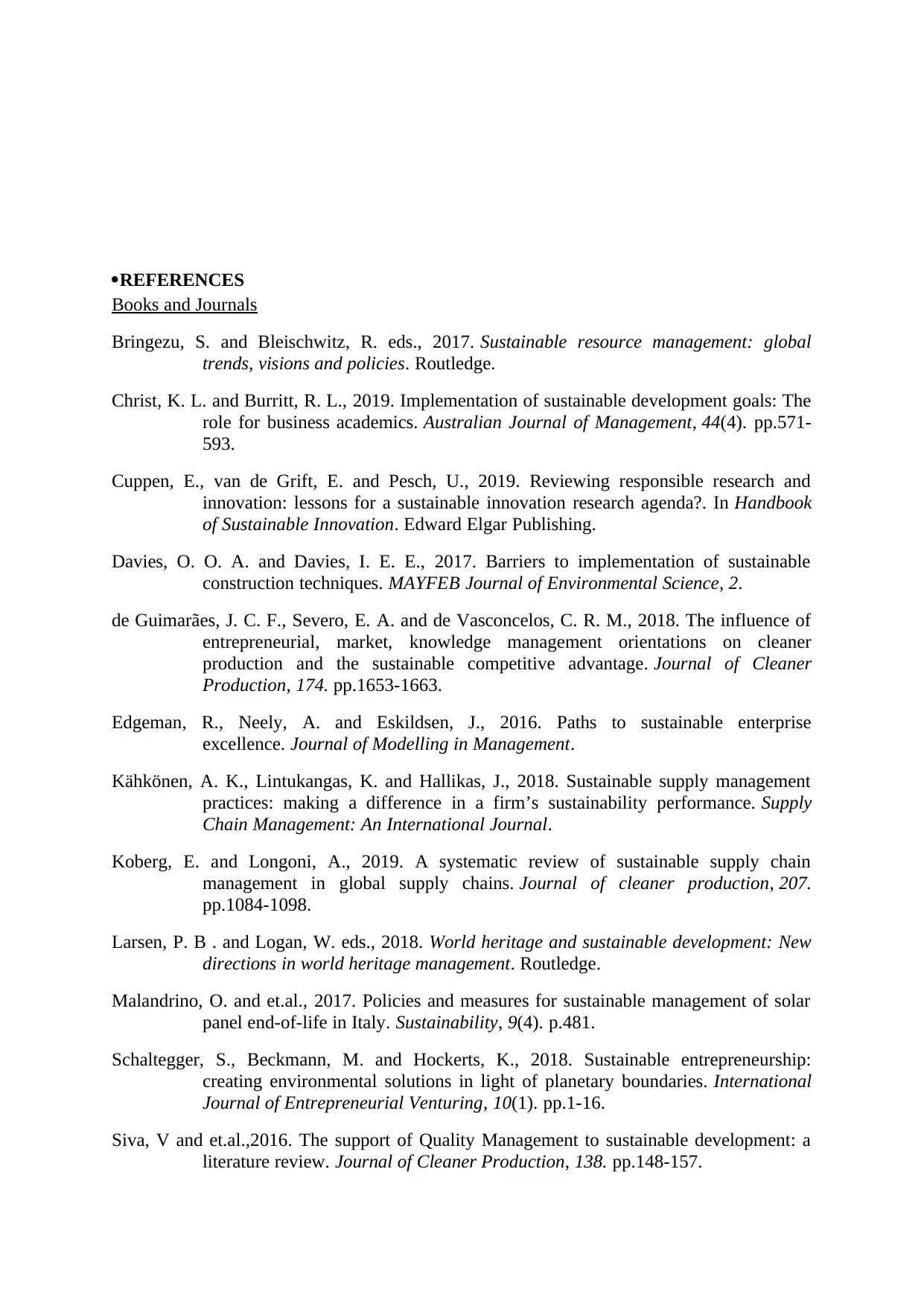
·REFERENCES
Books and Journals
Bringezu, S. and Bleischwitz, R. eds., 2017. Sustainable resource management: global
trends, visions and policies. Routledge.
Christ, K. L. and Burritt, R. L., 2019. Implementation of sustainable development goals: The
role for business academics. Australian Journal of Management, 44(4). pp.571-
593.
Cuppen, E., van de Grift, E. and Pesch, U., 2019. Reviewing responsible research and
innovation: lessons for a sustainable innovation research agenda?. In Handbook
of Sustainable Innovation. Edward Elgar Publishing.
Davies, O. O. A. and Davies, I. E. E., 2017. Barriers to implementation of sustainable
construction techniques. MAYFEB Journal of Environmental Science, 2.
de Guimarães, J. C. F., Severo, E. A. and de Vasconcelos, C. R. M., 2018. The influence of
entrepreneurial, market, knowledge management orientations on cleaner
production and the sustainable competitive advantage. Journal of Cleaner
Production, 174. pp.1653-1663.
Edgeman, R., Neely, A. and Eskildsen, J., 2016. Paths to sustainable enterprise
excellence. Journal of Modelling in Management.
Kähkönen, A. K., Lintukangas, K. and Hallikas, J., 2018. Sustainable supply management
practices: making a difference in a firm’s sustainability performance. Supply
Chain Management: An International Journal.
Koberg, E. and Longoni, A., 2019. A systematic review of sustainable supply chain
management in global supply chains. Journal of cleaner production, 207.
pp.1084-1098.
Larsen, P. B . and Logan, W. eds., 2018. World heritage and sustainable development: New
directions in world heritage management. Routledge.
Malandrino, O. and et.al., 2017. Policies and measures for sustainable management of solar
panel end-of-life in Italy. Sustainability, 9(4). p.481.
Schaltegger, S., Beckmann, M. and Hockerts, K., 2018. Sustainable entrepreneurship:
creating environmental solutions in light of planetary boundaries. International
Journal of Entrepreneurial Venturing, 10(1). pp.1-16.
Siva, V and et.al.,2016. The support of Quality Management to sustainable development: a
literature review. Journal of Cleaner Production, 138. pp.148-157.
Books and Journals
Bringezu, S. and Bleischwitz, R. eds., 2017. Sustainable resource management: global
trends, visions and policies. Routledge.
Christ, K. L. and Burritt, R. L., 2019. Implementation of sustainable development goals: The
role for business academics. Australian Journal of Management, 44(4). pp.571-
593.
Cuppen, E., van de Grift, E. and Pesch, U., 2019. Reviewing responsible research and
innovation: lessons for a sustainable innovation research agenda?. In Handbook
of Sustainable Innovation. Edward Elgar Publishing.
Davies, O. O. A. and Davies, I. E. E., 2017. Barriers to implementation of sustainable
construction techniques. MAYFEB Journal of Environmental Science, 2.
de Guimarães, J. C. F., Severo, E. A. and de Vasconcelos, C. R. M., 2018. The influence of
entrepreneurial, market, knowledge management orientations on cleaner
production and the sustainable competitive advantage. Journal of Cleaner
Production, 174. pp.1653-1663.
Edgeman, R., Neely, A. and Eskildsen, J., 2016. Paths to sustainable enterprise
excellence. Journal of Modelling in Management.
Kähkönen, A. K., Lintukangas, K. and Hallikas, J., 2018. Sustainable supply management
practices: making a difference in a firm’s sustainability performance. Supply
Chain Management: An International Journal.
Koberg, E. and Longoni, A., 2019. A systematic review of sustainable supply chain
management in global supply chains. Journal of cleaner production, 207.
pp.1084-1098.
Larsen, P. B . and Logan, W. eds., 2018. World heritage and sustainable development: New
directions in world heritage management. Routledge.
Malandrino, O. and et.al., 2017. Policies and measures for sustainable management of solar
panel end-of-life in Italy. Sustainability, 9(4). p.481.
Schaltegger, S., Beckmann, M. and Hockerts, K., 2018. Sustainable entrepreneurship:
creating environmental solutions in light of planetary boundaries. International
Journal of Entrepreneurial Venturing, 10(1). pp.1-16.
Siva, V and et.al.,2016. The support of Quality Management to sustainable development: a
literature review. Journal of Cleaner Production, 138. pp.148-157.
⊘ This is a preview!⊘
Do you want full access?
Subscribe today to unlock all pages.

Trusted by 1+ million students worldwide
1 out of 13
Related Documents
Your All-in-One AI-Powered Toolkit for Academic Success.
+13062052269
info@desklib.com
Available 24*7 on WhatsApp / Email
![[object Object]](/_next/static/media/star-bottom.7253800d.svg)
Unlock your academic potential
Copyright © 2020–2025 A2Z Services. All Rights Reserved. Developed and managed by ZUCOL.





